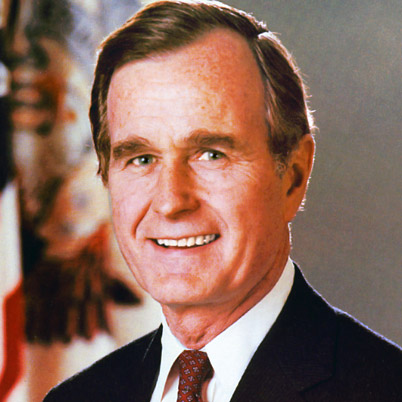George Bush is an American politician who served as the 41st President of the United States from 1989-1993. Before his time as president, he served as the 43 Vice President of the United States from 1981-1989. He also served as a congressman, an ambassador, and the Director of Central Intelligence.
Bush was born in Milton Massachusetts in 1924. After the attack on Pearl Harbor, he signed up for the U.S Navy immediately, becoming the youngest aviator at the time. He remained an aviator for the rest of the war, returning to school when he got back to the States. He got involved in the oil business in West Texas and became a millionaire at age 40. This wealth helped him to enter the world of politics, and he steadily climbed the political ladder over the years.
His presidency succeeded Ronald Reagan’s and, at one point, had a record high approval rating. He helped to pass the Americans with Disabilities Act of 1990, which was considered one of the most pro-civil rights bills to be passed in decades (although Bush went on to veto the original Civil Rights Act of 1990). Much of his attention was focused on increasing federal spending for education, childcare, and advanced technology. Two other important laws he signed into action were the influential Clean Air Act and The Immigration Act of 1990. While he had famously promised “no new taxes” in his presidential campaign, he was forced to raise them by Democratic majority in congress. This, coupled with a six-month-long recession, resulted in a massive drop in popularity.
Bush was also known for his militaristic actions while in office. He successfully (and controversially) removed Manuel Noriega from his position of leadership in Panama, met with Gorbachev in Malta to promote peace, and, in 1991, Bush launched an attack on Iraqi forces stationed in Kuwait. The Gulf War offensive was considered a success, as Iraqi troops were pushed out of Kuwait and the U.S. did not extend its reach and attempt to takeover the Iraqi goverment.
